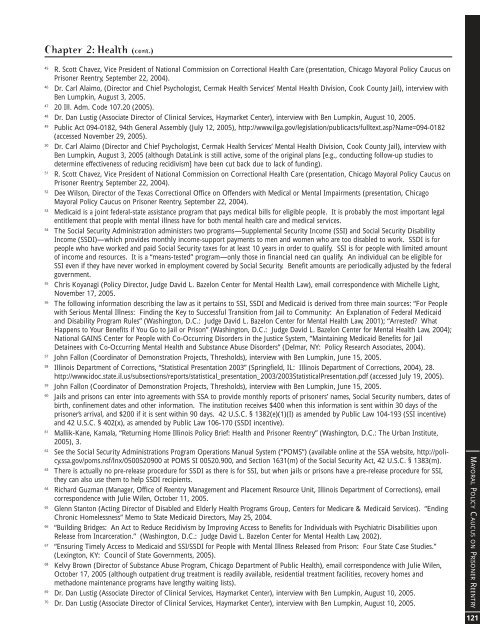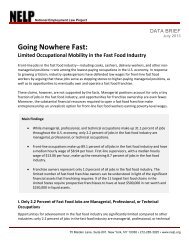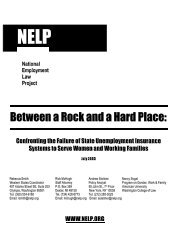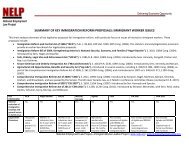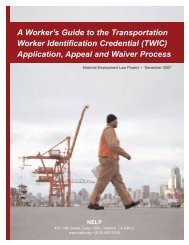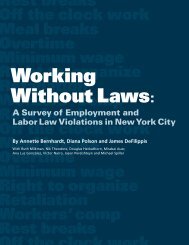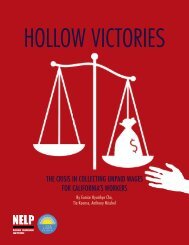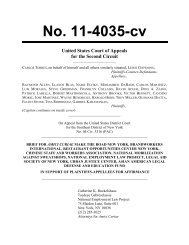Rebuilding Lives. Strengthening Communities.
Rebuilding Lives. Strengthening Communities.
Rebuilding Lives. Strengthening Communities.
You also want an ePaper? Increase the reach of your titles
YUMPU automatically turns print PDFs into web optimized ePapers that Google loves.
Chapter 2: Health (cont.)<br />
45<br />
R. Scott Chavez, Vice President of National Commission on Correctional Health Care (presentation, Chicago Mayoral Policy Caucus on<br />
Prisoner Reentry, September 22, 2004).<br />
46<br />
Dr. Carl Alaimo, (Director and Chief Psychologist, Cermak Health Services’ Mental Health Division, Cook County Jail), interview with<br />
Ben Lumpkin, August 3, 2005.<br />
47<br />
20 Ill. Adm. Code 107.20 (2005).<br />
48<br />
Dr. Dan Lustig (Associate Director of Clinical Services, Haymarket Center), interview with Ben Lumpkin, August 10, 2005.<br />
49<br />
Public Act 094-0182, 94th General Assembly (July 12, 2005), http://www.ilga.gov/legislation/publicacts/fulltext.aspName=094-0182<br />
(accessed November 29, 2005).<br />
50<br />
Dr. Carl Alaimo (Director and Chief Psychologist, Cermak Health Services’ Mental Health Division, Cook County Jail), interview with<br />
Ben Lumpkin, August 3, 2005 (although DataLink is still active, some of the original plans [e.g., conducting follow-up studies to<br />
determine effectiveness of reducing recidivism] have been cut back due to lack of funding).<br />
51<br />
R. Scott Chavez, Vice President of National Commission on Correctional Health Care (presentation, Chicago Mayoral Policy Caucus on<br />
Prisoner Reentry, September 22, 2004).<br />
52<br />
Dee Wilson, Director of the Texas Correctional Office on Offenders with Medical or Mental Impairments (presentation, Chicago<br />
Mayoral Policy Caucus on Prisoner Reentry, September 22, 2004).<br />
53<br />
Medicaid is a joint federal-state assistance program that pays medical bills for eligible people. It is probably the most important legal<br />
entitlement that people with mental illness have for both mental health care and medical services.<br />
54<br />
The Social Security Administration administers two programs—Supplemental Security Income (SSI) and Social Security Disability<br />
Income (SSDI)—which provides monthly income-support payments to men and women who are too disabled to work. SSDI is for<br />
people who have worked and paid Social Security taxes for at least 10 years in order to qualify. SSI is for people with limited amount<br />
of income and resources. It is a “means-tested” program—only those in financial need can qualify. An individual can be eligible for<br />
SSI even if they have never worked in employment covered by Social Security. Benefit amounts are periodically adjusted by the federal<br />
government.<br />
55<br />
Chris Koyanagi (Policy Director, Judge David L. Bazelon Center for Mental Health Law), email correspondence with Michelle Light,<br />
November 17, 2005.<br />
56<br />
The following information describing the law as it pertains to SSI, SSDI and Medicaid is derived from three main sources: “For People<br />
with Serious Mental Illness: Finding the Key to Successful Transition from Jail to Community: An Explanation of Federal Medicaid<br />
and Disability Program Rules” (Washington, D.C.: Judge David L. Bazelon Center for Mental Health Law, 2001); “Arrested What<br />
Happens to Your Benefits if You Go to Jail or Prison” (Washington, D.C.: Judge David L. Bazelon Center for Mental Health Law, 2004);<br />
National GAINS Center for People with Co-Occurring Disorders in the Justice System, “Maintaining Medicaid Benefits for Jail<br />
Detainees with Co-Occurring Mental Health and Substance Abuse Disorders” (Delmar, NY: Policy Research Associates, 2004).<br />
57<br />
John Fallon (Coordinator of Demonstration Projects, Thresholds), interview with Ben Lumpkin, June 15, 2005.<br />
58<br />
Illinois Department of Corrections, “Statistical Presentation 2003” (Springfield, IL: Illinois Department of Corrections, 2004), 28.<br />
http://www.idoc.state.il.us/subsections/reports/statistical_presentation_2003/2003StatisticalPresentation.pdf (accessed July 19, 2005).<br />
59<br />
John Fallon (Coordinator of Demonstration Projects, Thresholds), interview with Ben Lumpkin, June 15, 2005.<br />
60<br />
Jails and prisons can enter into agreements with SSA to provide monthly reports of prisoners’ names, Social Security numbers, dates of<br />
birth, confinement dates and other information. The institution receives $400 when this information is sent within 30 days of the<br />
prisoner’s arrival, and $200 if it is sent within 90 days. 42 U.S.C. § 1382(e)(1)(I) as amended by Public Law 104-193 (SSI incentive)<br />
and 42 U.S.C. § 402(x), as amended by Public Law 106-170 (SSDI incentive).<br />
61<br />
Mallik-Kane, Kamala, “Returning Home Illinois Policy Brief: Health and Prisoner Reentry” (Washington, D.C.: The Urban Institute,<br />
2005), 3.<br />
62<br />
See the Social Security Administrations Program Operations Manual System (“POMS”) (available online at the SSA website, http://policy.ssa.gov/poms.nsf/lnx/0500520900<br />
at POMS SI 00520.900, and Section 1631(m) of the Social Security Act, 42 U.S.C. § 1383(m).<br />
63<br />
There is actually no pre-release procedure for SSDI as there is for SSI, but when jails or prisons have a pre-release procedure for SSI,<br />
they can also use them to help SSDI recipients.<br />
64<br />
Richard Guzman (Manager, Office of Reentry Management and Placement Resource Unit, Illinois Department of Corrections), email<br />
correspondence with Julie Wilen, October 11, 2005.<br />
65<br />
Glenn Stanton (Acting Director of Disabled and Elderly Health Programs Group, Centers for Medicare & Medicaid Services). “Ending<br />
Chronic Homelessness” Memo to State Medicaid Directors, May 25, 2004.<br />
66<br />
“Building Bridges: An Act to Reduce Recidivism by Improving Access to Benefits for Individuals with Psychiatric Disabilities upon<br />
Release from Incarceration.” (Washington, D.C.: Judge David L. Bazelon Center for Mental Health Law, 2002).<br />
67<br />
“Ensuring Timely Access to Medicaid and SSI/SSDI for People with Mental Illness Released from Prison: Four State Case Studies.”<br />
(Lexington, KY: Council of State Governments, 2005).<br />
68<br />
Kelvy Brown (Director of Substance Abuse Program, Chicago Department of Public Health), email correspondence with Julie Wilen,<br />
October 17, 2005 (although outpatient drug treatment is readily available, residential treatment facilities, recovery homes and<br />
methadone maintenance programs have lengthy waiting lists).<br />
69<br />
Dr. Dan Lustig (Associate Director of Clinical Services, Haymarket Center), interview with Ben Lumpkin, August 10, 2005.<br />
70<br />
Dr. Dan Lustig (Associate Director of Clinical Services, Haymarket Center), interview with Ben Lumpkin, August 10, 2005.<br />
MAYORAL POLICY CAUCUS ON PRISONER REENTRY<br />
121


